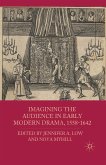Explores popular Renaissance tragedies through a chronological commentary of political, social, cultural and aesthetic factorsThis book covers the development of tragedy as a dramatic genre from its earliest examples in the 1560's until the closure of the theatres in 1642. It traces the astonishingly diverse range of tragedies as they were influenced by the growth of public and private theatre venues in London. Tragedy was the most popular and the most diverse of theatrical genres during the English Renaissance; it was also the most disruptive and subversive. For Shakespeare and his contemporaries, tragedy reaches kings and queens and everyday person alike. Tragedy has rules, but these were rules that playwrights were ready to trouble and transform to meet changes in society and politics, in theatre venue, and in audience demand.Key FeaturesPlays and their authors are discussed alongside each other against the background of the socio-cultural and political conditions of their timesShows the degree to which theatre history can be connected with other significant contextual factors and critical ideas in analysis of the tragedies of the English RenaissanceReflects the latest scholarship of early modern theatre history (especially London theatres), the history of performance and acting and the print history of stage playsInspects the sub-genres associated with the form, such as revenge tragedy, historical tragedy, domestic tragedy, tragicomedy and closet drama
Dieser Download kann aus rechtlichen Gründen nur mit Rechnungsadresse in A, B, BG, CY, CZ, D, DK, EW, E, FIN, F, GR, HR, H, IRL, I, LT, L, LR, M, NL, PL, P, R, S, SLO, SK ausgeliefert werden.









